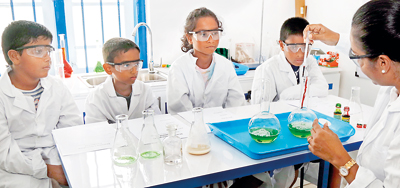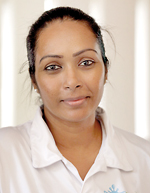Learning science the fun way

Hands on: Doing an experiment in the lab. Pix by M.A. Pushpa Kumara
A mixture of hydrogen peroxide, dishwash, potassium iodide, yeast and food colouring creates what Hasanthini Samuel calls “Elephant toothpaste”. Her students watch in amazement as it swirls around the tube – a common reaction at “FunLab” – her innovative way of teaching kids science.
Here science is taught in a fun and interesting way to young children through the use of games, art, group activities, lab work and experiments, so that they can observe the fundamental principles of science and understand how they work in everyday life.
In creating the programme, Hasanthini drew on her own life, going back to her schooldays when she was failing maths. Her father started to teach her using more interactive and hands-on methods and soon she was excelling in the subject, going from 20% to a 90% grades. “It is not a child’s fault if they had not been taught the basics properly. They have to be taught the basics in a fun and interesting manner so that they can comprehend the fundamentals and won’t have any difficulty in secondary school and higher education,” she says.
Thus, she created programmes where she could do just that and make it enjoyable for her students as well as enrich their lives.
With programmes for children of the ages 3 to 14, the youngsters enjoy the fun of doing experiments under supervision. She offers two programmes, the first – The little scientist – Category A (3 and 4- year- olds) and Category B ( 5 to 7-year- olds), the second, the Little Einstein course – Category A (8 -10-year-olds) and Category B (11 – 14-year- olds). Her syllabus rotates from physics, biology, and chemistry and each week they cover different areas.

Hasanthini Samuel
Her Little Scientist and Little Einstein programmes cover the fundamental concepts needed for O’ levels, not specifically targeting term tests but covering everything in the local syllabus.
By giving them the opportunity to do experiments in the lab, the students feel like real scientists equipped with lab coats and protective glasses. Before they enter the lab, they are shown a video that teaches them how to be in a lab, the do’s and don’ts. Her classes give students the opportunity to use the lab as much as they need to which is something that they aren’t able to get in school.
The environment is not restricted to the lab as her students are able to grow different plants in her garden and watch the life cycles of different species such as butterflies. In addition, she introduces vocabulary needed for their O’ levels, this is reinforced in the lab as every instrument has a label with its scientific name to assist the students in learning the terminology.
A student of Sirimavo Bandaranaike Vidyalaya, Hasanthini completed her further education at the Institute of Chemistry (ICEM) and followed it up with a postgraduate degree (MSc) in natural resource management at Peradeniya University. She has taught for many years but felt she could do something better on her own with more hands-on activities, teaching the practical aspects of science difficult in schools where you are constrained by the time frame. Having hands on activities is the best method of teaching children science, she feels.
Gaining knowledge through experience, exploration, and experimentation she believes will allow students to successfully retain information. When she taught her students the eight phases of the moon they had to do handwork depicting it. In her science lab, she does not follow a rigorous curriculum but takes the time to answer questions and explain things slowly so that they can understand exactly what she is teaching them.
“If a child is truly interested they will ask many questions,” she adds.
Last December, she held a five-day Science holiday camp and has just completed one this April. A half-day camp for kids from the ages of 4 to 7 will be on from 23rd to 25th at FunLab in Dehiwala.
For more information on FunLab, see https://www.facebook.com/FunLabSriLanka/ and http://www.funlab.lk/


